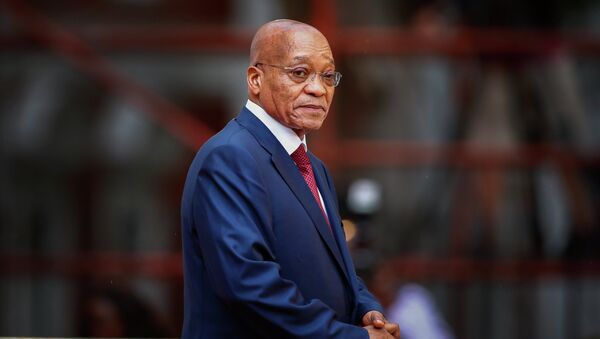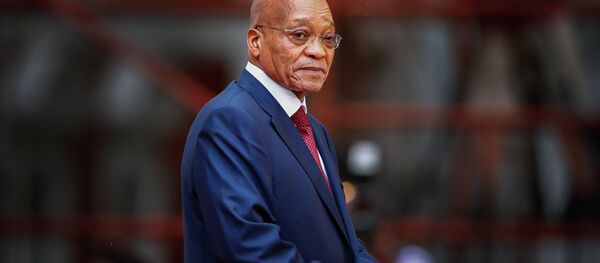Kristian Rouz – South African President Jacob Zuma is back at it: his long-standing conflict with Finance Minister Pravin Gordhan has escalated to the point where the Head of State is considering Gordhan’s dismissal yet again, sending the rand’s FX rate sharply lower.
Gordhan, the South African finance minister since December 2015, has won the praise of investors and international rating agencies for repeatedly saving the nation’s credit rating since his appointment into the office. However, his vision of much-needed economic reform differs greatly from President Zuma’s agenda aimed at greater centralization at an increased, dirigiste role of the government in the economy.
The conflict between Zuma and Gordhan has how exacerbated, as the president had said in a conversation with his political allies he intends to fire the Finance Minister.
Zuma, of the ruling African National Congress Party (ANC), sent the national currency, the rand, plummeting against a basket of major currencies. The president discussed his plans to dismiss Gordhan, also of the ANC, in a private conversation with high-ranking members of the South African Communist Party.
Zuma and Gordhan, albeit both belong to the ANC, have a drastically different image in the eyes of investors. Market participants tend to trust Gordhan and his reform agenda. Zuma, on his part, by aligning himself with the Communist Party, sent a rather disturbing “my way or the highway” signal to the market: the president might be ambitiously enforcing his vision of the nation’s future above the needs of the market economy.
Zuma had his meeting with the Communist Party leaders Monday in Johannesburg, and, although no official statement followed, the general market sentiment is pessimistic. The resident also recalled Gordhan from his business trip: the finance minister had scheduled meetings with US and UK investors.
Following these events, the rand dropped 3.2 percent against the dollar, and almost 5 percent against the pound sterling. South African stocks and bonds took a beating as well, with the banking sector slumping by 2 percent. The speculation of Gordhan’s possible dismissal is interpreted in a very straightforward way: once the current finance minister is gone, a credit rating downgrade from international rating agencies is almost imminent.
“It’s obviously going to be interpreted very negatively by the markets unless we are able to explain in a compelling manner, which I think is difficult by the way, why such a roadshow was cancelled,” Martin Kingston of NM Rothschild & Sons Ltd. in Johannesburg said.
International rating agencies, such as Fitch and S&P, have repeatedly approved South Africa’s credit rating above ‘junk’ level over the past year mainly because of private investor trust in Gordhan and the feasibility of his reform effort. The nation’s economy has slowed to almost a halt of stagnation over the past couple of years. Mining, one of South Africa’s main sources of revenue, has been faltering since the drop in raw material prices in 2013. Agriculture is struggling amidst violent farm attacks and acute land disputes, whilst the expansion in the services sector is still insufficient to drive the broader economy.
“The days in which manufacturing and mining could create millions of jobs are gone: the formal jobs … are disappearing across the globe. The question is not how to get them back but how to ensure that everyone can make a living without them,” Steven Friedman of the University of Johannesburg said.
Over the past year, Gordhan’s main effort was aimed at encouraging international investors to allocate capital in the South African economy. If Gordhan leaves his office, and South Africa’s credit rating is “junked,” the nation will struggle to borrow in international money markets.
What will happen next is the decline in South Africa’s governmental bond value, and a sharp increase in yields, a sign of higher economic instability.
Without a sustainable influx of capital, the current expansion in the services sector will halt or reverse, resulting in the entire economy sliding into a recession as agriculture and manufacturing have been significantly weakened over the past years.
The rand stood at 12.3 against the dollar March 27, however, market shockwaves sent it to 12.8 by Tuesday, and market participants are betting against the currency, seeing it as touching 14 in the coming days.
Another issue that impaired market sentiment is that the powerful Gupta family, perceived as allies of the Zuma’s, have had a conflict with Gordhan. The minister previously froze the bank accounts of Sahara Computers, a company that belongs to the Guptas, along with having frozen several other accounts associated with the family.
Zuma pulled Gordhan from his international trip to appear in court of Tuesday after the Guptas filed an application for him to do so. Gordhan previously asked the state attorney to stand in court for him. The court will determine whether the finance minister should reopen the accounts of the companies controlled by the Guptas.
“This action by the presidency rolls back the progress we have made as a country,” Cas Coovadia, the managing director of the Banking Association of South Africa, said in a statement. “It also militates against the imperative of ensuring political and policy certainty.”
The international rating agency Moody’s will update their view of South Africa’s credit rating April 7. The rating is still above “junk,” but a threat of economic chaos following the recent wave of political turmoil might render both investors and rating agencies even more skeptical of the economic prospects of South Africa.




